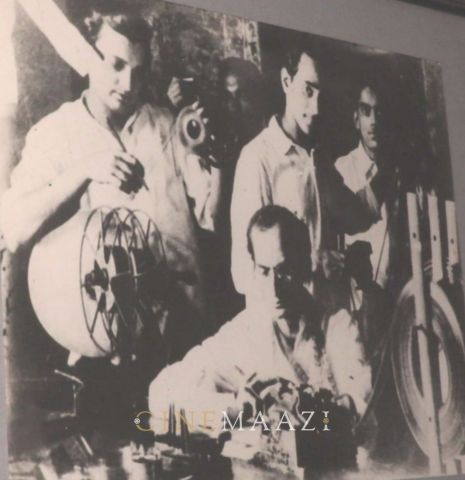Jyotiprasad Agarwala (1903- 1951) was an Indian cultural genius from Assam. The Assamese people affectionately call him Rupkonwar. Meanwhile, Hiren Gohain, one of the most prominent literary critics, has called Jyotiprasad Agarwala ‘Bhabikalar Khinikar’ (architect of the future).
There is no doubt that Jyotiprasad Agarwala was a poet, lyricist, musician, playwright, and above all, he was a great artist. In a relatively short span of life, he composed hundreds of songs and poems, plays, short stories, novels and articles on different matters and themes related to politics, literature, art and architecture etc.

Moreover, Jyotiprasad Agarwala was a revolutionary figure from Assam. He was the true representative of the new age of cultural awakenings in modern Assamese society. The speeches that he had delivered after India achieved independence have also revealed his understanding of the socio-cultural transformation of society.
His socio-cultural mission had clear-cut political views, i.e. enabling individuals and nations to manifest all creative potentialities inherent in them. On the other hand, Jyotiprasad Agarwala’s revolutionary writings highlight his deep consciousness about all kinds of domination, oppression and exploitation over the poor by the capitalist class.
It is also known to us that Jyotiprasad Agarwala also actively participated in the Indian national movement. At the anti-British struggle, Jyotiprasad Agarwala was an ardent follower of M.K. Gandhi’s political philosophy.
Even his literary works are filled with the glorification of M.K. Gandhi. Since his college days, Jyotiprasad Agarwala was involved in the anti-British struggle. He completely stood against the British colonial rule and capitalist exploiter class.

In the non-cooperation movement, which was launched in 1920-21 to oppose the British colonial rule in India, Jyotiprasad Agarwala left his school to join the movement. He joined in the picketing of liquor and opium shops, the boycott of foreign cloths and propagation of swadeshi goods during the non-cooperation movement.
Similarly, he was also involved in the Civil Disobedience Movement as per the direction of the Indian national congress. Jyotiprasad Agarwala also organized a Children’s Volunteer Corps to spread the spirit of nationalism and patriotism in 1931.
Kanaklata Barua, who was also called Birbala (brave) and Shaheed (martyr), was one of the members of this volunteer group. It is seen that Jyotiprasad Agarwala played a vital role in the Quit India Movement of 1942. He fully supported Gandhi’s call of ‘Do or Die’ to liberate the motherland from the hands of British colonial rule.
Jyotiprasad Agarwala was closely associated with all the activities of the Quit India Movement. He organized the Santi Bahini and the Mrityu Bahini to spread revolutionary activities among the common people.
Iswar Prasad Chowdhury, in his book ‘Jyotiprasad Agarwala’ (1986), has pointed out that Jyotiprasad Agarwala toured extensively throughout Assam, explaining to people the meaning of the revolutionary movement and training how to behave in certain situations.
During the burning days of the anti-British movement, Jyotiprasad Agarwala composed many patriotic poems and songs to infuse the revolutionary spirit among the common people of Assam. Such songs and poems include – ‘Biswabijoi na-jowan’, ‘Axomia Dekar’, ‘Axomia Sualir Ukti’, ‘Gaon Jiory’ etc.
Although Jyotiprasad Agarwala actively participated in the Indian national movement against British colonial rule, he gradually felt that the Congress Government was moving away from the principle that M.K. Gandhi had propagated. It was reflected in his poem ‘Xabodhan Xabodhan’ as- “Xubidhabadi doll, Tur misa hobo kousal, Raijor toi xewa sur kori, Bohrabo khujiso ball” (A party that takes advantage, your strategies will be in vain. Stealing from the public, you wish to enhance your power).
Jyotiprasad Agarwala had a progressive political idea that individual freedom and liberty are the foundation of humanity’s better stage. He also had a clear vision of Assamese nationalism.
He did not support narrow nationalism in the name of the language, ethnicity and religion. Jyotiprasad Agarwala wrote in his poem –“Bhasat sartru,deshot sartru, kala sahityat , sangeet xilpot, homal sartru tor vitarat” (Enemy of the language, enemy of the nation, enemy to the arts and culture.)
Undoubtedly, Jyotiprasad Agarwala’s revolutionary feelings have been reflected through his creative works. For him, the revolution was also a unique cultural revolution. He considered human progress as a cultural mission for the upward mobility of human civilization.
References:
- Dutta,Akhil Ranjan (ed). Culture Ideology Politics: Jyotiprasad Agarwala and his Vision for Social Transformation. Guwahati: DVS Publishers, 2012.
- Gohain, Hiren(ed).Jyotiprasad Rachanavali. Guwahati:Axom Prokashan Parishad, 2003.
